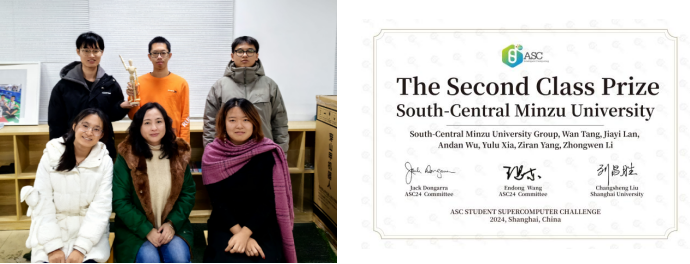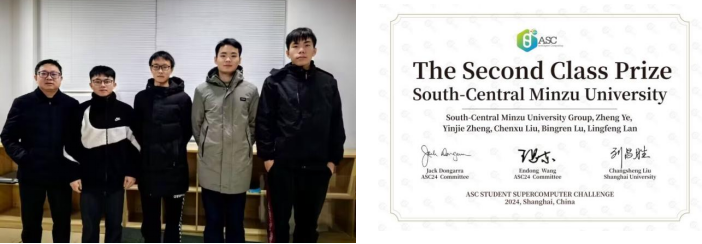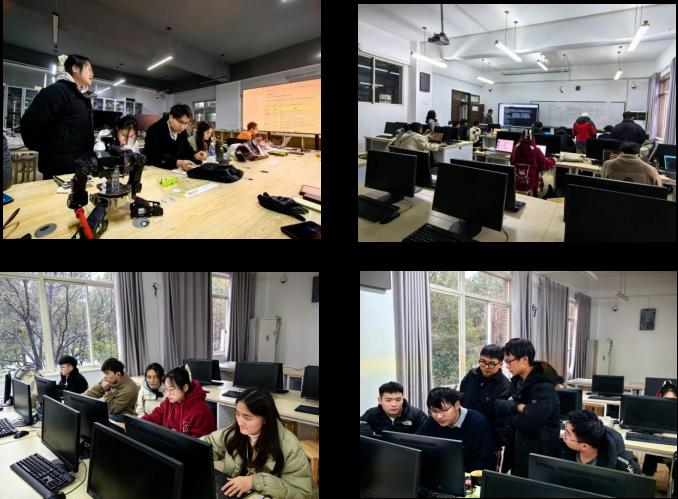Once Again, We Achieved Outstanding Results in the 2024 ASC Student Supercomputer Challenge (ASC2024)
Author:Shuo Yang Edit:Yonghui You Uploader:Zhu Menghuan Reviewer:Zuntao Ke, Yangguang Sun Published:2024-02-08 Views:
February 4, 2024 - The preliminary results for the 2024 ASC Student Supercomputer Challenge (ASC24) in Asia, standing as one of the top three global supercomputing competitions alongside the Supercomputing Conference (SC) in the US and the International Supercomputing Conference(ISC) in Germany, have been announced. Our students have once again achieved remarkable success in the ASC competition. Three teams formed by undergraduates from the School of Computer Science won three Second Class prizes, which is a great achievement.

ASC24 Team 1: [Suting Li, Hongjun Li, Peng Cheng(Advisor), Kewei Chen, Shuo Yang, Gan Peng]

ASC24 Team 2: [ Yulu Xia, Andan Wu, Wan Tang (Advisor), Jiayi Lan,Ziran Yang, Zhongwen Li ]

ASC24 Team 3: [Zheng Ye (Advisor), Lingfeng Lan, Yinjie Zheng, Chenxu Liu, Bingren Lu]
The preliminary round of ASC24 encompassed tasks in high-performance computing (HPC) system design, optimization of the High-Performance Linpack (HPL) and High-Performance Conjugate Gradient (HPCG) benchmarks, optimization of Large Language Model (LLM) inference, and the OpenCAEPoro Challenge for numerical simulation of fluid seepage. The final two competition tasks concentrated on artificial intelligence and practical engineering challenges. The LLM inference optimization task required teams to construct and optimize an inference engine based on the popular open-source large language model LLaMA2, aiming to achieve high-throughput inference on a dataset of 10,000 samples provided by the organizing committee. The OpenCAEPoro Challenge tasked teams with studying the complex flow patterns and characteristics of multi-phase fluids in porous media, requiring them to simulate oil, gas, and water seepage in oil extraction scenarios based on the provided dataset, and to optimize the large-scale parallel computing process to enhance the computational performance and parallel efficiency of the discrete algorithms.
These tasks, involving multiple domains of supercomputing and artificial intelligence, were a significant test of the teams' learning and practical abilities in supercomputing application analysis, performance optimization, and parallel strategy design. Our three competing teams consisted of 14 undergraduate students from four majors: Artificial Intelligence, Computer Science and Technology, Network Engineering, and Software Engineering, across three academic years. From the release of the tasks to the deadline, within 31 days, they actively participated in the competition, overcoming many difficulties and challenges of the competition period coinciding with the end-of-term review and exams, and the first-time use of the computing power platform provided by the Wuhan Artificial Intelligence Computing Center. The detailed English technical reports they submitted elaborated on cluster design, source code optimization, and output files, demonstrating their excellent technical strength and innovative problem-solving abilities. It also verified the comprehensive quality and teamwork level of the competing teams.
The ASC Student Supercomputer Challenge began in 2012 and has been held for 11 consecutive sessions, evolving from China to Asia, and then from Asia to the world, with its influence continuously increasing. It is currently the globe’s largest scale and most participated student supercomputing competition. In the ASC24 competition, teams from Beijing University of Science and Technology, Beijing Normal University, Tsinghua University, Hong Kong University of Science and Technology, Zhejiang University, Wuhan University, Fuzhou University, and 89 other teams won the Second Class prizes.

Team members are actively preparing for the ASC24 competition.
The ASC Supercomputer Challenge aims to cultivate young talent, promote the research, development, and innovation of supercomputing, and facilitate the widespread application of supercomputing in various industries. The School of Computer Science places great emphasis on the cultivation of college students' supercomputing application abilities. The Supercomputing Team of our university was established at the end of 2018, led by the Department of Artificial Intelligence, with several professional mentors from the college of Computer Science, such as Wan Tang, Zheng Ye, Xiao Zhang, Ximin Yang, Peng Cheng, et al., and currently has more than 20 team members. To date, the team has participated in four consecutive ASC Student Supercomputer Competitions, and all ten participating teams have won the Second Class prizes. The Supercomputing Team looks forward to more students joining in and exploring the infinite possibilities of supercomputing.